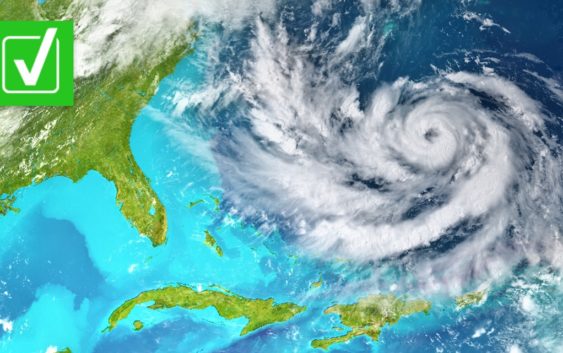- Five homes damaged in Durham fire, firefighters say
- Researchers forecast 1 major Gulf hurricane in 2025 season
- NC State forecasts near-average Atlantic hurricane season
- Timeline: Texas cold front brings hail, heavy rainfall risk to major cities
- Evacuation order issued as crews battle wildfire in McDowell County
VERIFY: Hurricanes almost always hit the East Coast and rarely strike the West Coast, due to two key factors

Only three tropical systems in 200 years have struck the West Coast, because weather conditions in the Pacific are unfavorable for storms.
GREENSBORO, N.C. — All is quiet right now in the Atlantic; it’s almost eerie, considering we’ve had an active and early season with five named storms.
Last week, we verified why hurricanes spin the way they do — counterclockwise in the Northern Hemisphere and clockwise in the Southern Hemisphere.
RELATED: VERIFY: Hurricanes always spin counterclockwise in Northern Hemisphere, because of this phenomenon
VERIFY QUESTION
Now, let’s examine them from a geographic perspective.
You’ve noticed all of our storms this season have tried to push their way up the East Coast. So, is it true hurricanes almost never hit the West Coast?
VERIFY SOURCES
VERIFY PROCESS
To stop the “spin” on misinformation and VERIFY the facts, we consulted our weather experts — meteorologist Christian Morgan and the National Hurricane Center.
They affirm the answer is — true.
“Really, there are two key factors behind why that happens. One — water temperature. Two — the wind flow. (A temperature of) 80-degrees Fahrenheit is kind of that magic number we want, if we want storms to form. Warmer ocean water is usually conducive to those showers and thunderstorms continuing to organize,” he explained.
Temperature alone, though, isn’t enough to dictate where storms form. The other factor is the wind flow.
“We talk about the trade winds a lot. When we want a storm to ride up the coast of NC, it starts out closer to the equator, where the trade winds blow from east to west. On the West Coast, the trades are still blowing from east to west, so even if a storm takes a path toward the California coast, it’s going to run into that cold ocean water, and that’s really going to help it dissipate,” he said.
Bottom line? “Cold ocean water is really kind of a death knell for hurricanes,” he emphasized.
That does not mean the west has steered clear of tropical activity. There are a few instances in history when hurricanes have, indeed, hit that coast.
“There were rare instances – in fact, only three that I could find,” Morgan said.
The most recent one of note was 1976 — Hurricane Kathleen.
“(She) actually formed about 250 miles southwest of the coast of Mexico. It did eventually become a category one hurricane, but then it weakened down before it moved onto land in California. And, actually, most of that rain from that storm fell in Baja, CA,” he said.
As for the other two West Coast storms, there was the San Diego hurricane of 1858 and the Long Beach tropical storm of 1939.
“That was way before they named storms the way they do (now). So, only three named storms (have formed) in the last 200 years, and really, only two of those have happened since 1900.”
VERIFY CONCLUSION
It’s true — hurricanes hit the East Coast far more frequently than they hit the West Coast, because of factors like water temperature and trade winds.
Do you have a VERIFY inquiry? Submit a post, screen shot or selfie video of the claim to Meghann Mollerus via:
Facebook: Meghann Mollerus News
E-mail: Mmollerus@wfmy.com